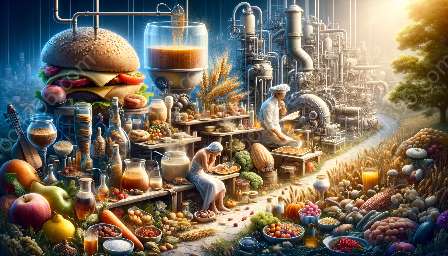Throughout human history, the evolution of cooking and culinary techniques has been intertwined with food technology, innovation, and culture. From the earliest methods of roasting over an open flame to modern molecular gastronomy, the way we prepare and consume food has undergone significant changes. The journey of cooking and culinary techniques has been shaped by cultural practices, technological advancements, and the constant quest for new flavors and experiences.
Early Cooking Techniques and Culinary History
The origins of cooking can be traced back to the discovery of fire, which allowed our ancestors to roast and char food for consumption. Over time, early humans began to experiment with different cooking methods, such as boiling and steaming, using natural materials like leaves and animal hides as containers. As communities evolved, so did their culinary practices, leading to the development of unique regional cuisines around the world.
Impact of Food Technology and Innovation
The evolution of cooking techniques and culinary traditions has been closely linked to advancements in food technology. The invention of pottery, for instance, enabled the creation of more elaborate cooking vessels, while the development of metal cookware revolutionized food preparation. Over the centuries, innovations such as the invention of the oven, the introduction of refrigeration, and the rise of industrialized food production have transformed the way we cook and consume food.
In recent years, the fusion of food technology and culinary innovation has given rise to molecular gastronomy, a cutting-edge approach to cooking that blends science and art to create avant-garde dishes and flavor combinations.
Evolution of Food Culture and Culinary Diversity
Food culture and culinary diversity have been shaped by a multitude of factors, including geography, climate, agriculture, and trade. As civilizations connected through exploration and trade routes, culinary traditions blended, giving rise to diverse and eclectic cuisines. The exchange of spices, cooking techniques, and ingredients between different cultures has enriched the global culinary landscape and continues to influence modern cooking practices.
Furthermore, the advent of globalization and the digital era has facilitated the exchange of culinary ideas and techniques, leading to the popularization of diverse cuisines worldwide.
Modern Influences on Culinary Techniques
In the modern era, the evolution of cooking and culinary techniques has been further accelerated by technological advancements and contemporary trends. The emergence of high-tech kitchen appliances, such as sous vide machines and immersion blenders, has revolutionized precision cooking and flavor extraction. Additionally, the growing emphasis on sustainability and ethical food sourcing has given rise to innovative cooking methods that minimize waste and promote environmental stewardship.
Conclusion
The evolution of cooking and culinary techniques reflects the dynamic interplay between food technology, innovation, and cultural exchange. From ancient cooking methods to the modern fusion of science and gastronomy, the journey of culinary evolution offers a rich tapestry of flavors, traditions, and ingenuity that continues to inspire and delight food enthusiasts around the world.

